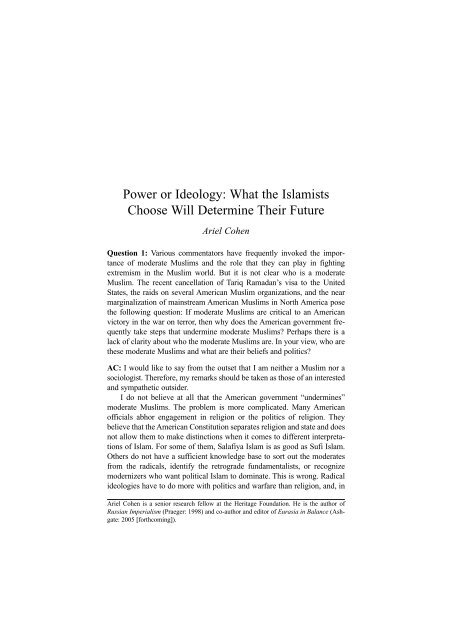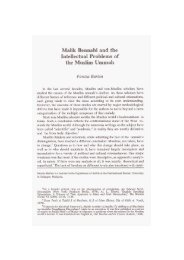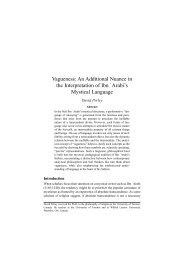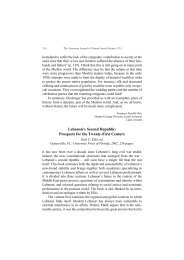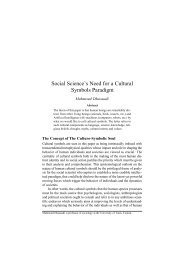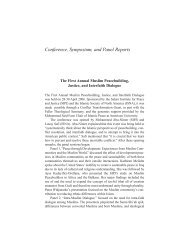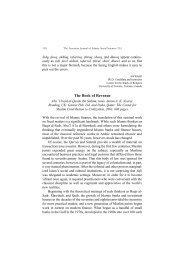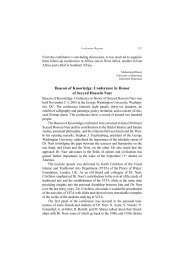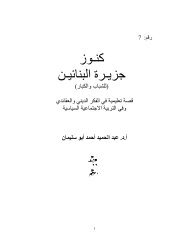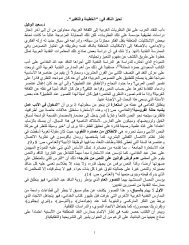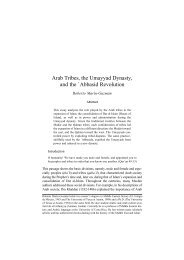Power or Ideology: What the Islamists Choose Will ... - Epistemology
Power or Ideology: What the Islamists Choose Will ... - Epistemology
Power or Ideology: What the Islamists Choose Will ... - Epistemology
Create successful ePaper yourself
Turn your PDF publications into a flip-book with our unique Google optimized e-Paper software.
<strong>Power</strong> <strong>or</strong> <strong>Ideology</strong>: <strong>What</strong> <strong>the</strong> <strong>Islamists</strong><br />
<strong>Choose</strong> <strong>Will</strong> Determine Their Future<br />
Ariel Cohen<br />
Question 1: Various commentat<strong>or</strong>s have frequently invoked <strong>the</strong> imp<strong>or</strong>tance<br />
of moderate Muslims and <strong>the</strong> role that <strong>the</strong>y can play in fighting<br />
extremism in <strong>the</strong> Muslim w<strong>or</strong>ld. But it is not clear who is a moderate<br />
Muslim. The recent cancellation of Tariq Ramadan’s visa to <strong>the</strong> United<br />
States, <strong>the</strong> raids on several American Muslim <strong>or</strong>ganizations, and <strong>the</strong> near<br />
marginalization of mainstream American Muslims in N<strong>or</strong>th America pose<br />
<strong>the</strong> following question: If moderate Muslims are critical to an American<br />
vict<strong>or</strong>y in <strong>the</strong> war on terr<strong>or</strong>, <strong>the</strong>n why does <strong>the</strong> American government frequently<br />
take steps that undermine moderate Muslims? Perhaps <strong>the</strong>re is a<br />
lack of clarity about who <strong>the</strong> moderate Muslims are. In your view, who are<br />
<strong>the</strong>se moderate Muslims and what are <strong>the</strong>ir beliefs and politics?<br />
AC: I would like to say from <strong>the</strong> outset that I am nei<strong>the</strong>r a Muslim n<strong>or</strong> a<br />
sociologist. Theref<strong>or</strong>e, my remarks should be taken as those of an interested<br />
and sympa<strong>the</strong>tic outsider.<br />
I do not believe at all that <strong>the</strong> American government “undermines”<br />
moderate Muslims. The problem is m<strong>or</strong>e complicated. Many American<br />
officials abh<strong>or</strong> engagement in religion <strong>or</strong> <strong>the</strong> politics of religion. They<br />
believe that <strong>the</strong> American Constitution separates religion and state and does<br />
not allow <strong>the</strong>m to make distinctions when it comes to different interpretations<br />
of Islam. F<strong>or</strong> some of <strong>the</strong>m, Salafiya Islam is as good as Sufi Islam.<br />
O<strong>the</strong>rs do not have a sufficient knowledge base to s<strong>or</strong>t out <strong>the</strong> moderates<br />
from <strong>the</strong> radicals, identify <strong>the</strong> retrograde fundamentalists, <strong>or</strong> recognize<br />
modernizers who want political Islam to dominate. This is wrong. Radical<br />
ideologies have to do m<strong>or</strong>e with politics and warfare than religion, and, in<br />
Ariel Cohen is a seni<strong>or</strong> research fellow at <strong>the</strong> Heritage Foundation. He is <strong>the</strong> auth<strong>or</strong> of<br />
Russian Imperialism (Praeger: 1998) and co-auth<strong>or</strong> and edit<strong>or</strong> of Eurasia in Balance (Ashgate:<br />
2005 [f<strong>or</strong>thcoming]).
2 The American Journal of Islamic Social Sciences 22:3<br />
some extreme cases, should not enjoy <strong>the</strong> constitutional protections of freedom<br />
of religion <strong>or</strong> free speech. There is a difference between propagating<br />
a faith and disseminating hatred, violence, <strong>or</strong> murder. The latter is an abuse<br />
and exploitation of faith f<strong>or</strong> political ends, and should be treated as such.<br />
F<strong>or</strong> example, <strong>the</strong> racist Aryan Nation churches were prosecuted and bankrupted<br />
by American NGOs and <strong>the</strong> American government.<br />
One of <strong>the</strong> problems is that <strong>the</strong> American government allows radical<br />
Muslims who supp<strong>or</strong>t terr<strong>or</strong>ism to operate with impunity in <strong>the</strong> United<br />
States and around <strong>the</strong> w<strong>or</strong>ld, and does very little to supp<strong>or</strong>t moderate<br />
Muslims, especially in <strong>the</strong> conflict zones. To me, moderate Muslims are<br />
those who do not view <strong>the</strong> “greater jihad” ei<strong>the</strong>r as a pillar of faith <strong>or</strong> as a<br />
predominant dimension <strong>the</strong>reof. A moderate is one who is searching f<strong>or</strong> a<br />
dialogue and a compromise with people who adhere to o<strong>the</strong>r interpretations<br />
of <strong>the</strong> Qur’an, and with those who are not Muslim. A moderate Sunni, f<strong>or</strong><br />
example, will not supp<strong>or</strong>t terr<strong>or</strong> attacks on Shi`ahs <strong>or</strong> Sufis, <strong>or</strong> on<br />
Christians, Jews, <strong>or</strong> Hindus.<br />
Moderate Muslims respect <strong>the</strong> right of individuals to disagree, to w<strong>or</strong>ship<br />
Allah <strong>the</strong> way <strong>the</strong>y chose, <strong>or</strong> not to w<strong>or</strong>ship – and even not to believe. A moderate<br />
Muslim is one who is willing to bring his <strong>or</strong> her bro<strong>the</strong>r <strong>or</strong> sister to faith<br />
by love and logic, not by m<strong>or</strong>tal threats <strong>or</strong> f<strong>or</strong>ce of arms. A moderate Muslim<br />
decries suicide bombings and terr<strong>or</strong>ist “operations,” and abh<strong>or</strong>s those clerics<br />
who indoctrinate toward, bless, and supp<strong>or</strong>t such atrocities.<br />
The list of moderate Muslims is too long to give all <strong>or</strong> even a part of it<br />
here. Shaykh Muhammad Hisham Kabbani (chairman of <strong>the</strong> Islamic<br />
Supreme Council of America) and Sheikh Abdul Hadi Palazzi (secretarygeneral<br />
of <strong>the</strong> Rome-based Italian Muslim Association) come to mind.<br />
Ayatollah Ali Sistani may be a moderate, but I need to read m<strong>or</strong>e of his<br />
teachings. As <strong>the</strong> Wahhabi attacks against <strong>the</strong> Shi`ah escalate, Shi`i clerics<br />
and leaders are beginning to speak up. Examples include Sheikh Agha Jafri,<br />
a Westchester-based Pakistani Shi`ah who heads an <strong>or</strong>ganization called <strong>the</strong><br />
Society f<strong>or</strong> Humanity and Islam in America, and Tashbih Sayyed, a<br />
Calif<strong>or</strong>nia-based Pakistani who serves as president of <strong>the</strong> Council f<strong>or</strong><br />
Democracy and Tolerance.<br />
I admire <strong>the</strong> bravery of Amina Wadud, a female profess<strong>or</strong> of Islamic<br />
studies at Virginia Commonwealth University who led a mixed-gender<br />
Friday Islamic prayer service, acc<strong>or</strong>ding to Mona Eltahawy’s op-ed piece<br />
in The Washington Post on Friday, March 18, 2005 (“A Prayer Toward<br />
Equality”). Ano<strong>the</strong>r brave woman is <strong>the</strong> co-founder of <strong>the</strong> Progressive<br />
Muslim Union of America, Sarah Eltantawi. And <strong>the</strong> whole w<strong>or</strong>ld is proud
Cohen: <strong>Power</strong> <strong>or</strong> <strong>Ideology</strong> 3<br />
of <strong>the</strong> achievements of Judge Shirin Ebadi, <strong>the</strong> Iranian human rights lawyer<br />
who was awarded <strong>the</strong> Nobel peace prize in 2003.<br />
There is a problem with <strong>the</strong> first question, however. It contains several<br />
assumptions that are debatable, to say <strong>the</strong> least, if not outright false. First,<br />
it assumes that Tariq Ramadan is a “moderate.” Never<strong>the</strong>less, <strong>the</strong>re is a<br />
near-consensus that Ramadan, while calling f<strong>or</strong> ijtihad, is a supp<strong>or</strong>ter of <strong>the</strong><br />
Egyptian Ikhwan al-Muslimin [<strong>the</strong> Muslim Bro<strong>the</strong>rhood] and comes from<br />
that tradition [he is <strong>the</strong> grandson of its founder, Hasan al-Banna]. He also<br />
expressed supp<strong>or</strong>t f<strong>or</strong> Yusuf al-Qaradawi (and all he stands f<strong>or</strong>) on a BBC<br />
TV program, and is viewed as an anti-Semite. He also rationalizes <strong>the</strong> murder<br />
of children, though apparently that does not preclude <strong>the</strong> European<br />
Social F<strong>or</strong>um from inviting him to be a member. He and Hasan al-Turabi,<br />
<strong>the</strong> founder of <strong>the</strong> Islamic state in Sudan, have exchanged compliments.<br />
There are numerous rep<strong>or</strong>ts in <strong>the</strong> media, quoting intelligence sources and<br />
ex-terr<strong>or</strong>ists, that Ramadan associates with <strong>the</strong> most radical circles, including<br />
terr<strong>or</strong>ists. In its decision to ban Ramadan, <strong>the</strong> United States Department<br />
of Homeland Security was guided by a number of issues, some of <strong>the</strong>m<br />
rep<strong>or</strong>ted in <strong>the</strong> media and o<strong>the</strong>rs classified. This is sufficient f<strong>or</strong> me to<br />
believe that Ramadan may be a security risk who, in <strong>the</strong> post-9/11 environment,<br />
could reasonably be banned from entering <strong>the</strong> United States. 1<br />
Second, <strong>the</strong> raids on “American Muslim <strong>or</strong>ganizations” are, in fact, a<br />
part of law enf<strong>or</strong>cement operations. Some of <strong>the</strong>se steps have had to do<br />
with investigations of terr<strong>or</strong>ist activities, such as <strong>the</strong> alleged Libyan conspiracy<br />
to assassinate Crown Prince Abdullah of Saudi Arabia. O<strong>the</strong>rs<br />
focused on American Islamist <strong>or</strong>ganizations that were funding <strong>the</strong> terr<strong>or</strong>ist<br />
activities of groups on <strong>the</strong> State Department’s terr<strong>or</strong>ism watch list, such as<br />
Hamas. To say that <strong>the</strong>se criminal investigations are targeting moderate<br />
Islam is like saying that investigating pedophile priests undermines freedom<br />
of religion in <strong>the</strong> United States.<br />
Finally, American Muslims are hardly marginalized. They enjoy unencumbered<br />
religious life and supp<strong>or</strong>t numerous non-governmental <strong>or</strong>ganizations<br />
that often take positions highly critical of domestic and f<strong>or</strong>eign<br />
policy – something that is often not <strong>the</strong> case in <strong>the</strong>ir countries of <strong>or</strong>igin.<br />
There is no job discrimination – some seni<strong>or</strong> Bush Administration officials,<br />
such as Elias A. Zerhouni, head of <strong>the</strong> National Institutes of Health<br />
(NIH), are Muslims. American presidents have congratulated Muslims on<br />
religious holidays and often invite Muslim clergymen to imp<strong>or</strong>tant state<br />
functions, such as <strong>the</strong> funeral of f<strong>or</strong>mer president Ronald Reagan.
4 The American Journal of Islamic Social Sciences 22:3<br />
Question 2: The Muslim w<strong>or</strong>ld is experiencing a period of turmoil. At <strong>the</strong><br />
heart of this turmoil is <strong>the</strong> debate over <strong>the</strong> role of Islam in Muslim society,<br />
particularly in its political sphere. At one extreme <strong>the</strong>re is secular despotism,<br />
which seeks to dominate Muslim societies, and at <strong>the</strong> o<strong>the</strong>r extreme is <strong>the</strong><br />
specter of Islamic totalitarianism. The hope in <strong>the</strong> middle is <strong>the</strong> possible role<br />
that moderate Muslims can play in establishing Islamic democracies. Until<br />
now, <strong>the</strong><strong>or</strong>ists in <strong>the</strong> West have visualized secular Turkey as a model f<strong>or</strong> <strong>the</strong><br />
Muslim w<strong>or</strong>ld. Is it possible to imagine that <strong>the</strong> Turkish <strong>Islamists</strong>, now under<br />
<strong>the</strong> leadership of such visionaries such as Prime Minister Erdogan, are <strong>the</strong><br />
harbingers of moderate Islam and Islamic democracy?<br />
AC: The Turkish case is country- and society-specific. When <strong>the</strong> Turkish<br />
Islamic politicians talk to westerners, <strong>the</strong>y call <strong>the</strong>mselves “Turkish Christian<br />
Democrats” – culturally conservative, economically market-<strong>or</strong>iented, and<br />
open to <strong>the</strong> outside w<strong>or</strong>ld. Internally, <strong>the</strong>y promote agendas that raise eyebrows<br />
in <strong>the</strong> West and raise hackles among Turkish secularists, such as<br />
increased funding f<strong>or</strong> secondary religious education, preferential treatment<br />
f<strong>or</strong> <strong>the</strong> graduates of religious schools in college admissions, criminalizing<br />
adultery, and relaxing rules on <strong>the</strong> hijab.<br />
The AK party’s c<strong>or</strong>e constituency is less than 20 percent of <strong>the</strong> Turkish<br />
elect<strong>or</strong>ate. The rest are opp<strong>or</strong>tunists who voted f<strong>or</strong> <strong>the</strong> Islamic party<br />
because of non-religious issues, such as its promises of m<strong>or</strong>e effective and<br />
less c<strong>or</strong>rupt governance. They may swing away from <strong>the</strong> AK party, as <strong>the</strong>y<br />
have from o<strong>the</strong>r Turkish parties in <strong>the</strong> past. In o<strong>the</strong>r countries, <strong>the</strong> ratio of<br />
c<strong>or</strong>e voters and fellow travelers can be different, affecting <strong>the</strong> strength of<br />
<strong>Islamists</strong> in power.<br />
Hist<strong>or</strong>ically, Ottoman Islam was ra<strong>the</strong>r tolerant, especially during <strong>the</strong><br />
centuries when <strong>the</strong> caliphate was in decline. The millet system, in which<br />
Christians and Jews were treated as autonomous communities, is a far cry<br />
from what is happening in many Muslim states today. In <strong>the</strong> Ottoman<br />
Empire, <strong>the</strong> relationship of Islam and <strong>the</strong> state had been evolving f<strong>or</strong> centuries,<br />
until Atatürk made a harsh break and essentially introduced <strong>the</strong> separation<br />
of mosque and state. Although <strong>the</strong> evolutionary pendulum may now<br />
be swinging in <strong>the</strong> opposite direction, <strong>the</strong> Turkish state still w<strong>or</strong>ks along <strong>the</strong><br />
lines of a secular constitution. In o<strong>the</strong>r places where <strong>Islamists</strong> participate in<br />
politics, this may <strong>or</strong> may not be <strong>the</strong> case.<br />
Today, <strong>the</strong> AK party’s version of <strong>the</strong> relationship between mosque and<br />
state is considerably m<strong>or</strong>e flexible than some of <strong>the</strong> modern interpretations<br />
in Iran (velayat al-faqih), Pakistan (<strong>the</strong> Jamaat-i Islamiya), Saudi Arabia (<strong>the</strong>
Cohen: <strong>Power</strong> <strong>or</strong> <strong>Ideology</strong> 5<br />
Salafists), <strong>or</strong> <strong>the</strong> Maghreb (<strong>the</strong> Islamic Salvation Front [FIS]). M<strong>or</strong>eover, if<br />
Turkey engages in <strong>the</strong> process of integrating into <strong>the</strong> European Union, a lot<br />
of issues between mosque and state will be influenced and regulated by <strong>the</strong><br />
documents defining accession, <strong>the</strong> so-called acquis communitaire. The separation<br />
of mosque and state, just as <strong>the</strong> separation of church and state, will<br />
be a part of such a regulation. There also will be limits placed upon <strong>the</strong> political,<br />
governmental, and social agendas promoted by <strong>Islamists</strong>.<br />
The political participation of Islamic parties in democratic societies is<br />
quite feasible and is happening beyond Turkey. This has been demonstrated<br />
in Bangladesh, Indonesia, Malaysia, Pakistan, Tajikistan, and elsewhere.<br />
Each country and each society has its own hist<strong>or</strong>y and political constellation.<br />
If constitutions are adhered to, and if <strong>the</strong>y stipulate essentially<br />
non-Shari`ah-based state architectures, Islamic parties will be capable of<br />
playing in <strong>the</strong> political field without breaking <strong>the</strong> constitutional sandbox.<br />
Question 3: Moderate Muslims are often associated with <strong>the</strong>ir advocacy of<br />
ijtihad and <strong>the</strong> subsequent ref<strong>or</strong>m of Muslim practice and interpretation of<br />
Islam through its much wider and systematic revival and application. Do<br />
you think that this faith in <strong>the</strong> promise of ijtihad is justified? Where is<br />
ref<strong>or</strong>m necessary? <strong>What</strong> do you understand by <strong>the</strong> term Islamic ref<strong>or</strong>m?<br />
Can Muslims develop modern, democratic, and prosperous societies without<br />
abandoning <strong>the</strong> wisdom and blessings of revelation?<br />
AC: My understanding is that ijtihad is recognized by <strong>the</strong> Shi`ah and<br />
frowned upon by mainstream scholars in <strong>the</strong> four principal Sunni madhhabs.<br />
However, <strong>the</strong> w<strong>or</strong>ld is changing, and <strong>the</strong> way we deal with it needs to keep<br />
up with <strong>the</strong> times. This is <strong>the</strong> essence of social evolution and ref<strong>or</strong>m. The<br />
lack of ability to evolve leads to dead ends as regards faith, politics, and economics.<br />
I do not wish this fate f<strong>or</strong> anyone, including my Muslim friends.<br />
However, abandoning values, ethics, and religion makes <strong>the</strong> modern technodriven<br />
w<strong>or</strong>ld soulless and dangerous. The challenge is to find <strong>the</strong> golden<br />
mean. Every religion, every culture finds a different answer.<br />
The modern w<strong>or</strong>ld is m<strong>or</strong>e interconnected. Business knows no national<br />
b<strong>or</strong>ders, and large c<strong>or</strong>p<strong>or</strong>ations are global. Many new technological breakthroughs<br />
need to be adjusted to our lives. O<strong>the</strong>rwise, we need to adjust to<br />
new technologies. The notion of modernization needs to be reconciled with<br />
faith. There is a place f<strong>or</strong> innovation in religion, which makes societies m<strong>or</strong>e<br />
modern and <strong>the</strong>ir members happier. If Muslims feel that <strong>the</strong>ir religion is too<br />
oppressive, many will leave it in disappointment.
6 The American Journal of Islamic Social Sciences 22:3<br />
They key to innovation is <strong>the</strong> ability to interpret <strong>the</strong> sacred text in such<br />
a way that it lives in harmony with our times. The text may require reinterpretation<br />
to accomplish that. Bringing women to equality is a huge challenge<br />
in Islam. Treating non-Muslims as equals and with respect, both within <strong>the</strong><br />
Land of Islam and outside, is ano<strong>the</strong>r critical challenge. Different branches<br />
of any religion may emphasize different parts of <strong>the</strong> sacred texts, <strong>the</strong>reby<br />
developing diverging narratives. After all, <strong>the</strong> Qur’an and <strong>the</strong> hadith were<br />
written f<strong>or</strong> a time and place very different from today. F<strong>or</strong> example, <strong>the</strong> marriage<br />
age was quite different – none but <strong>the</strong> strictest of literal fundamentalists<br />
would agree with marrying off 9-year-old girls nowadays, even if that<br />
was <strong>the</strong> age of <strong>the</strong> Prophet’s youngest wife. Women did not drive because<br />
cars did not exist. They did not go to college because <strong>the</strong>re were no colleges.<br />
Maybe <strong>the</strong> ancient societies could aff<strong>or</strong>d not to have women in <strong>the</strong> w<strong>or</strong>k<br />
f<strong>or</strong>ce <strong>or</strong> to keep <strong>the</strong>m segregated, but this is too high a price to pay in today’s<br />
w<strong>or</strong>ld, and that price is impoverishing <strong>the</strong> Land of Islam, by its own rep<strong>or</strong>ts. 2<br />
Many ancient Middle Eastern societies were tribal, monoethnic, and<br />
religiously intolerant. Conquering and assimilating “<strong>the</strong> o<strong>the</strong>r” was <strong>the</strong><br />
n<strong>or</strong>m. This was quite different from today’s megacities of <strong>the</strong> planet.<br />
However, religious intolerance, rejection of o<strong>the</strong>rs, as well as <strong>the</strong>ir values<br />
and even <strong>the</strong>ir right to exist, are quickly becoming a defining feature of <strong>the</strong><br />
m<strong>or</strong>e intolerant wings in <strong>the</strong> Muslim w<strong>or</strong>ld. This is where <strong>the</strong> ref<strong>or</strong>m is<br />
urgent – and probably overdue.<br />
The sacred texts must remain spiritually relevant, but may mean different<br />
things to different people in different periods of time. Ijtihad does not<br />
take <strong>the</strong> wisdom and beauty of <strong>the</strong> revelation away. I am sure that <strong>the</strong> Old<br />
and New Testaments meant different things in <strong>the</strong> ancient Middle East,<br />
when <strong>the</strong>se books were given – <strong>or</strong> written – and in medieval Europe.<br />
Modern interpretations are viewed through a new prism yet again. This is<br />
<strong>the</strong> reason why divergent commentaries and interpretations, from Thomas<br />
Aquinas (d. 1274) to Maimonides (d. 1204), to Ibn Rushd (d. 1198), to<br />
Reinhold Niebuhr (d. 1971), have proliferated. The three mono<strong>the</strong>istic religions<br />
influenced each o<strong>the</strong>r, including <strong>the</strong> inspiration of Sufi Islam to some<br />
of <strong>the</strong> mystical teachings of both Judaism and Christianity. Why not expl<strong>or</strong>e<br />
lessons from <strong>the</strong> evolution of <strong>the</strong>se two religions in a quest toward developing<br />
m<strong>or</strong>e tolerant interpretations that embrace modernity?<br />
In ancient times, Judaism and Christianity were far m<strong>or</strong>e intolerant religions<br />
than <strong>the</strong>y are now. But <strong>the</strong>y evolved. Those who reject modernity,<br />
including some aspects of technology, like <strong>the</strong> ultra-Orthodox Jews and <strong>the</strong><br />
Amish in <strong>the</strong> United States, are marginalized. They have become sects of
Cohen: <strong>Power</strong> <strong>or</strong> <strong>Ideology</strong> 7<br />
<strong>the</strong>ir own respective faiths. Muslims who reject technology, modernity, and<br />
progress, like <strong>the</strong> Taliban, are probably turning into blind alleys of human<br />
development. Fur<strong>the</strong>rm<strong>or</strong>e, as <strong>the</strong> w<strong>or</strong>ld is a m<strong>or</strong>e crowded place with<br />
evolving n<strong>or</strong>ms of behavi<strong>or</strong>, <strong>the</strong> “old ways,” which often resulted in warfare,<br />
may need to be reexamined and adjusted. As people invent weapons that<br />
may end civilization as we know it, some previous pronouncements regarding<br />
<strong>the</strong> killing of infidels may need to be reviewed and revised.<br />
As <strong>the</strong> w<strong>or</strong>ld recognizes human equality, including gender equality, and<br />
<strong>the</strong> rights of ethnic and religious min<strong>or</strong>ities as central elements of today’s<br />
existence, religions need to come to grips with this. O<strong>the</strong>r faiths already<br />
have: <strong>the</strong> Christian Ref<strong>or</strong>mation in <strong>the</strong> late Middle Ages, <strong>the</strong> Vatican II<br />
ref<strong>or</strong>ms of <strong>the</strong> 1960s, <strong>the</strong> emergence of Haskala (Education/Enlightenment)<br />
in eighteenth-century Orthodox Judaism and of <strong>the</strong> non-Orthodox (Conservative,<br />
Ref<strong>or</strong>m, and Reconstructionist) branches of Judaism in <strong>the</strong> nineteenth<br />
and twentieth centuries. Jewish Modern Orthodoxy emerged in <strong>the</strong><br />
last century. These ref<strong>or</strong>ms in <strong>the</strong> two o<strong>the</strong>r great religions of <strong>the</strong> People of<br />
<strong>the</strong> Book addressed specific needs and enriched <strong>the</strong> fabric of <strong>the</strong>se faiths<br />
without destroying <strong>the</strong>ir divine <strong>or</strong>igins. The need to adjust may affect most<br />
interpretations of Islam – o<strong>the</strong>rwise, serious contradictions within Islamic<br />
societies, such as <strong>the</strong> rights of women <strong>or</strong> <strong>the</strong> desire to be and feel a part of<br />
<strong>the</strong> outside w<strong>or</strong>ld, will continue to expand. Is <strong>the</strong>re a better tool to deal with<br />
conflicts and contradictions than ijtihad?<br />
However, <strong>the</strong> Iranian example demonstrates that ijtihad, by itself, may<br />
not be sufficient. Too often, religion is used in conjunction with politics <strong>or</strong><br />
f<strong>or</strong> political ends. Thus, ijtihad may need to be expl<strong>or</strong>ed in parallel with<br />
clear notions of <strong>the</strong> separation of religion and state, moving <strong>the</strong> faith into<br />
<strong>the</strong> realm of <strong>the</strong> spiritual and personal, and away from politics and <strong>the</strong><br />
temptations of state. Then and only <strong>the</strong>n can Muslims have <strong>the</strong> opp<strong>or</strong>tunity<br />
to create prosperous, modern, and democratic societies.<br />
Question 4: <strong>What</strong> is <strong>the</strong> future of political Islam? Does <strong>the</strong> emergence of<br />
such radical groups as al-Qaeda and o<strong>the</strong>rs undermine <strong>the</strong> legitimacy of<br />
Islamic movements in <strong>the</strong> Muslim w<strong>or</strong>ld, <strong>or</strong> does it enhance <strong>the</strong>ir appeal?<br />
<strong>Will</strong> we witness a resurgence in <strong>the</strong> relevance and influence of such groups<br />
as <strong>the</strong> Jamaat-i Islami and <strong>the</strong> Ikhwan al-Muslimin, <strong>or</strong> will <strong>the</strong>y slowly lose<br />
ground and appeal to m<strong>or</strong>e moderate movements? <strong>Will</strong> political Islamic<br />
movements radicalize <strong>or</strong> democratize?<br />
AC: The Jewish sages said that after <strong>the</strong> destruction of <strong>the</strong> [Jerusalem]<br />
Temple, <strong>the</strong> gift of prophecy is given to fools. So, I would ra<strong>the</strong>r not proph-
8 The American Journal of Islamic Social Sciences 22:3<br />
esize. The future of political Islam is what it makes of itself. If it pursues<br />
<strong>the</strong> road of violence, it will be met with violence, possibly with overwhelming<br />
f<strong>or</strong>ce, including from within <strong>the</strong> Muslim w<strong>or</strong>ld. In <strong>the</strong> sh<strong>or</strong>t run,<br />
an escalation in fighting may bring new proponents to its ranks. But in <strong>the</strong><br />
long run, radical, violent Islam will be hounded, denied sources of funding,<br />
and isolated, just like <strong>the</strong> Kharijites were.<br />
M<strong>or</strong>eover, <strong>the</strong> three state-size experiments of political Islam, namely,<br />
Iran, Afghanistan, and Sudan, are seen as unappealing at best and as hellish<br />
failures at w<strong>or</strong>st – not only by <strong>the</strong> outside w<strong>or</strong>ld, but also by <strong>the</strong> maj<strong>or</strong>ity<br />
of Muslims. People vote with <strong>the</strong>ir feet. M<strong>or</strong>e people want to live in <strong>the</strong><br />
United States and Western Europe than in Afghanistan, Iran, and Sudan<br />
under <strong>the</strong>ir respective Islamic regimes. Similarly, m<strong>or</strong>e people wanted to<br />
live in West Germany, Taiwan, and South K<strong>or</strong>ea than in East Germany,<br />
China, and N<strong>or</strong>th K<strong>or</strong>ea. You cannot fool all of <strong>the</strong> people all of <strong>the</strong> time,<br />
and it is not accidental that films and books concerning Afghanistan under<br />
<strong>the</strong> Taliban produced by Afghans <strong>the</strong>mselves depict a nightmare w<strong>or</strong>ld of<br />
oppression and cruelty.<br />
Finally, a lot will depend on mass supp<strong>or</strong>t f<strong>or</strong> political Islam. How determined<br />
and committed will it be? How effective will <strong>the</strong> West, moderate<br />
Muslims, and governments throughout <strong>the</strong> Greater Middle East be in<br />
demonstrating <strong>the</strong> political and m<strong>or</strong>al bankruptcy of violent movements and<br />
<strong>the</strong>ir leaders? F<strong>or</strong> example, what about <strong>the</strong> hundreds of millions of dollars<br />
that radical Muslim leaders ei<strong>the</strong>r received from <strong>the</strong> Saudi royal family,<br />
whom <strong>the</strong>y now decry, <strong>or</strong> “earned” through drug sales and diamond trafficking?<br />
Or, why do <strong>Islamists</strong> leaders, so quick to rationalize acts of martyrdom,<br />
not send <strong>the</strong>ir own children to commit murder-suicide bombings – <strong>or</strong><br />
just go push <strong>the</strong> buttons <strong>the</strong>mselves?<br />
As f<strong>or</strong> legitimacy, a lot depends on <strong>the</strong> West as well. Failure deligitimizes.<br />
A failure in <strong>the</strong> self-professed service of God (Allah) delegitimizes<br />
completely. With no military wins, al-Qaeda and its allies may suffer a loss<br />
of popular supp<strong>or</strong>t. The Jama`at-i Islami and <strong>the</strong> Ikhwan al-Muslimin are<br />
m<strong>or</strong>e complicated cases, because <strong>the</strong>ir success depends on <strong>the</strong> failure of secular<br />
dictat<strong>or</strong>ial opponents. If <strong>the</strong> government of Egypt, f<strong>or</strong> example, opens<br />
<strong>the</strong> political space f<strong>or</strong> ref<strong>or</strong>ms and voters see results, <strong>the</strong> Ikhwan may lose<br />
supp<strong>or</strong>t. On <strong>the</strong> o<strong>the</strong>r hand, <strong>the</strong> Ikhwan al-Muslimin, Hamas, and Hizballah<br />
show a lot of tactical flexibility by reaching out to individuals and circles traditionally<br />
not in <strong>the</strong>ir camp in <strong>or</strong>der to broaden <strong>the</strong>ir supp<strong>or</strong>t.<br />
The test f<strong>or</strong> some of <strong>the</strong>se movements is what do <strong>the</strong>y value m<strong>or</strong>e:<br />
power <strong>or</strong> ideology. If it is power, <strong>the</strong>y may compromise and liberalize in <strong>the</strong>
Cohen: <strong>Power</strong> <strong>or</strong> <strong>Ideology</strong> 9<br />
democratic context, <strong>or</strong> <strong>the</strong>y may try f<strong>or</strong> a violent solution, such as a coup –<br />
and if <strong>the</strong>y do, <strong>the</strong>y are likely to fail. If ideology is m<strong>or</strong>e imp<strong>or</strong>tant, <strong>the</strong>y will<br />
remain rigid and may decline like <strong>the</strong> western European communists did.<br />
Question 5: The growing presence of Islam in <strong>the</strong> West has clearly reached<br />
strategic prop<strong>or</strong>tions. Transatlantic relations are being mediated by <strong>the</strong><br />
strength of Muslim min<strong>or</strong>ities in Europe. There is a growing and influential<br />
Muslim community in N<strong>or</strong>th America. Some scholars and experts see<br />
Islam in <strong>the</strong> West as a threat to <strong>the</strong> West, while o<strong>the</strong>rs see it as a potential<br />
bridge between <strong>the</strong> West and <strong>the</strong> Muslim w<strong>or</strong>ld. <strong>What</strong> impact will Islam<br />
have on <strong>the</strong> West and Islamic-Western relations? Is <strong>the</strong> future of Islam and<br />
Muslims in <strong>the</strong> West in danger?<br />
AC: One cannot talk about <strong>the</strong> Muslim “community” as a whole. There are<br />
different communities with divergent agendas. Some want to be westerners<br />
of Islamic faith, enjoying economic opp<strong>or</strong>tunities and an essentially western<br />
lifestyle. O<strong>the</strong>rs are Muslims who happen to live in <strong>the</strong> West and view <strong>the</strong><br />
United States, and especially Europe, as simply additional places that must<br />
be “Islamized.” Some of <strong>the</strong> Saudi-funded curricula in western Muslim<br />
schools speak f<strong>or</strong> <strong>the</strong>mselves when <strong>the</strong>y preach hatred of <strong>the</strong> “infidels.”<br />
European positions on <strong>the</strong> Middle East have evolved as <strong>the</strong> Muslim<br />
min<strong>or</strong>ities <strong>the</strong>re have grown. This may explain, in part, <strong>the</strong> French opposition<br />
to <strong>the</strong> Iraq war. However, <strong>the</strong> murder of individual activists, as has happened<br />
in Holland with <strong>the</strong> public slaughter of filmaker Theo van Gogh in<br />
2004, <strong>or</strong> sustained supp<strong>or</strong>t f<strong>or</strong> terr<strong>or</strong>ism may bring on a backlash against<br />
Muslims in Europe.<br />
Those who view Muslims as a threat point to <strong>the</strong>ir low rate of integration<br />
in European societies. European racism and cultural rigidity probably<br />
are partially to blame f<strong>or</strong> this. But some practices of Islam in Europe give<br />
ample reason f<strong>or</strong> Europeans to be nervous. Many Europeans view radical<br />
Muslims’ social n<strong>or</strong>ms of women’s inequality, polygamy, and religious<br />
intolerance as threatening <strong>the</strong> c<strong>or</strong>e values of European secularist culture. The<br />
phenomenon of “weekend imams” who fly in from <strong>the</strong> Middle East to<br />
preach and leave after spending a weekend in <strong>the</strong> “land of infidels” w<strong>or</strong>ries<br />
not just European governments, but local moderate Muslims as well. Human<br />
rights n<strong>or</strong>ms and laws designed f<strong>or</strong> m<strong>or</strong>e peaceful times prevent police<br />
departments in Europe from actively pursuing those who plan attacks on<br />
government buildings and civilian targets in Great Britain, France, Spain,<br />
and elsewhere. However, this is slowly changing.
10 The American Journal of Islamic Social Sciences 22:3<br />
Americans are m<strong>or</strong>e tolerant of people of different faiths and races than<br />
<strong>the</strong>ir European cousins. In <strong>the</strong> past, <strong>the</strong> United States successfully abs<strong>or</strong>bed<br />
immigrants from Asia, Eastern Europe, and <strong>the</strong> Middle East. With that, <strong>the</strong><br />
domination of Wahhabi preachers in <strong>the</strong> maj<strong>or</strong>ity of American mosques and<br />
supp<strong>or</strong>t of terr<strong>or</strong>ist <strong>or</strong>ganizations could undermine tolerance of <strong>the</strong> American<br />
masses and body politic f<strong>or</strong> <strong>the</strong> peaceful life of Muslims in this country. If<br />
ano<strong>the</strong>r massive terr<strong>or</strong> attack happens in <strong>the</strong> United States, one cannot vouch<br />
f<strong>or</strong> <strong>the</strong> reaction of <strong>the</strong> public and <strong>the</strong> state. But even <strong>the</strong>n, most probably<br />
such self-defense would be exercised within <strong>the</strong> confines of <strong>the</strong> Constitution<br />
and acc<strong>or</strong>ding to <strong>the</strong> rule of law.<br />
Moderate Islam, which cleanses itself from extremism, may be a bridge<br />
to integration and a f<strong>or</strong>m of faith that promotes tolerance and allows Islam<br />
to thrive in western societies. F<strong>or</strong> that to happen, Islam at large, including<br />
those influential ulama (scholars) with access to massive petro-dollar financial<br />
supp<strong>or</strong>t, needs to make adjustments. F<strong>or</strong> example, those ulama need to<br />
start isolating and decrying radicals and terr<strong>or</strong>ists, as well as actively pursuing<br />
genuine peaceful political solutions f<strong>or</strong> conflicts in <strong>the</strong> Greater<br />
Middle East, including Israel and her neighb<strong>or</strong>s and Iraq. Such solutions<br />
would recognize <strong>the</strong> rights of all of <strong>the</strong> region’s states, min<strong>or</strong>ity groups, and<br />
inhabitants to a peaceful life with dignity and security.<br />
Finally, to survive and succeed in <strong>the</strong> West and throughout <strong>the</strong> Muslim<br />
w<strong>or</strong>ld, Islamic leaders and elites need to revisit and reexamine <strong>the</strong>ir social<br />
agendas. They need to recognize and secure women’s rights; face <strong>the</strong><br />
changing nature of gender relations; acknowledge <strong>the</strong> necessity to promote<br />
secular education, including among women and girls; and w<strong>or</strong>k to promote<br />
family planning and limit high birth rates, which only breed poverty and<br />
social failure. When progress is achieved on <strong>the</strong>se diverse and complex<br />
agendas, <strong>the</strong> future of Islam will be m<strong>or</strong>e secure.<br />
Endnotes<br />
1. http://www.militantislammonit<strong>or</strong>.<strong>or</strong>g/article/id/255.<br />
2. http://cfapp2.undp.<strong>or</strong>g/rbas/ahdr2.cfm?menu=12.


